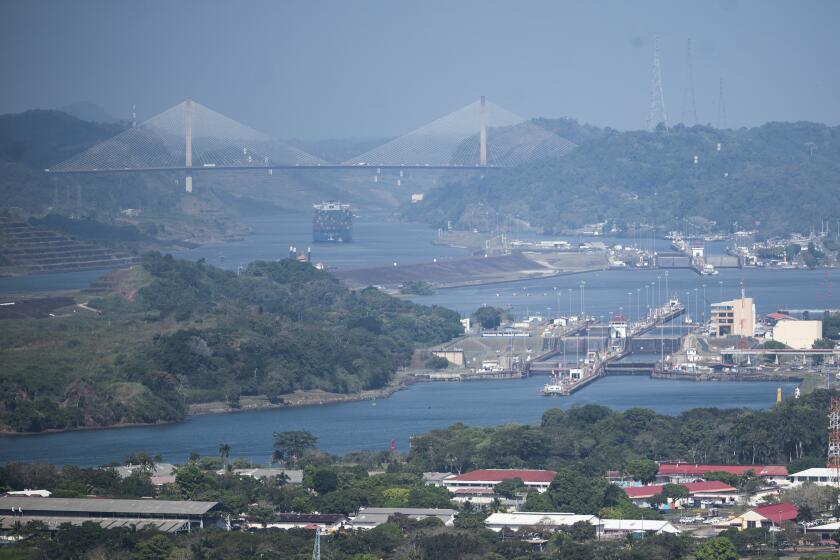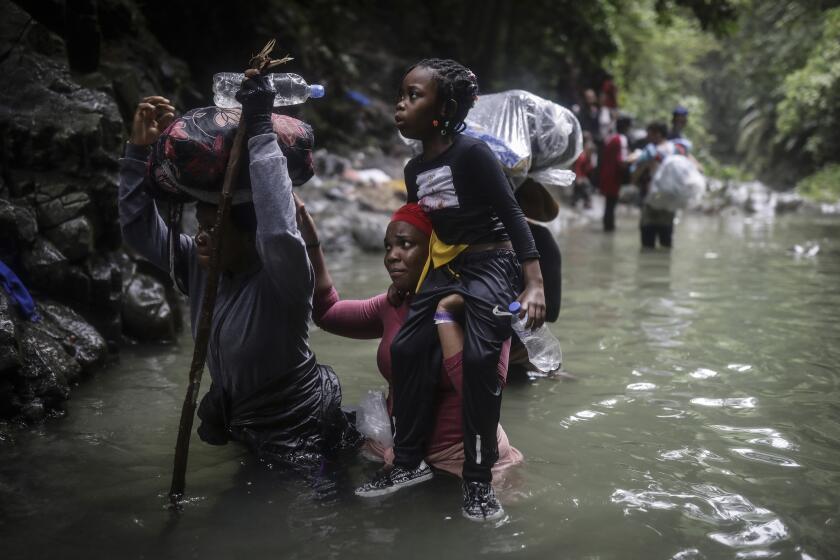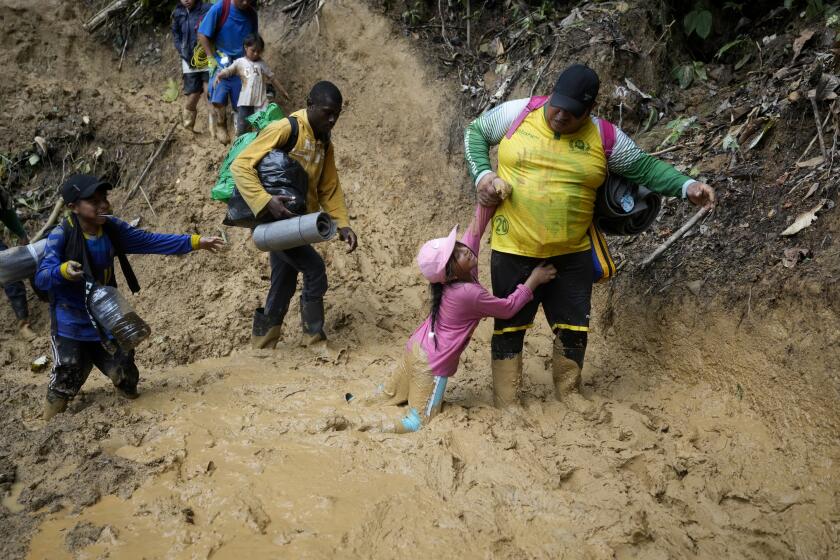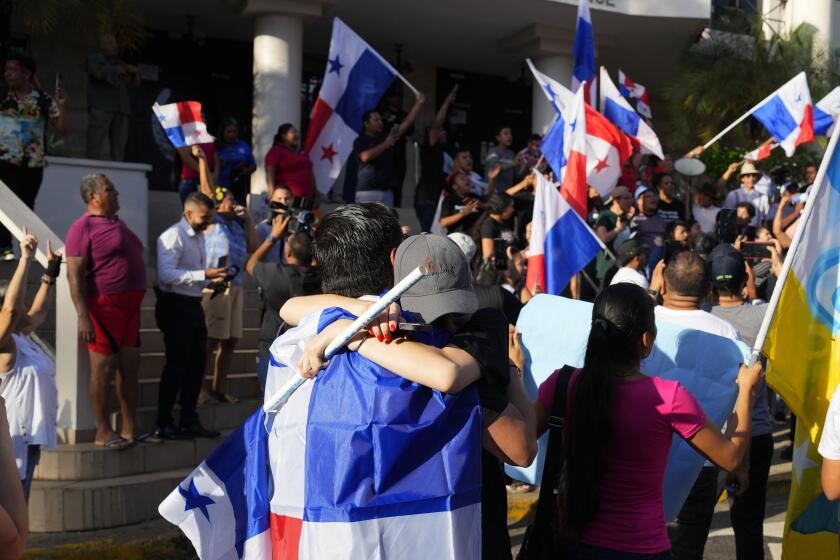Panama’s leading presidential candidate is a late entry promising a return to better times

- Share via
PANAMA CITY — The leading candidate to be Panama’s next president is a last-minute stand-in who promises to return the Central American country to a boom time that experts say will be difficult to recapture.
José Raúl Mulino, a maritime lawyer and former security minister, was thrust to the top of the presidential ticket after Panama’s electoral authorities ruled former President Ricardo Martinelli ineligible following his money laundering conviction and sentencing.
Lacking Martinelli’s charisma and popular appeal, but benefitting from the supermarket magnate’s vociferous support, Mulino has maintained a healthy lead in the field crowded with eight candidates ahead of the May 5 election.
The remaining field features a couple of also-rans from previous elections — Ricardo Lombana and Rómulo Roux — as well as former President Martín Torrijos. Those three are in a virtual tie for second behind Mulino, according to recent polls. Mulino skipped all three presidential debates.
A severe drought that began last year has forced officials to slash ship crossings by 36% in the Panama Canal, a globally important trade route.
Mulino has campaigned with promises to create jobs and stop migration through Panama’s Darien jungle, where more than a half million people trekked last year. The message has resonated with an electorate tired of the country’s political establishment, but nostalgic for the days of a humming economy.
Panama, however, is not growing like it was during Martinelli’s 2009-2014 presidency, and experts expect the economy to slow next year.
A factor in the economic deceleration is the Supreme Court’s decision to declare as unconstitutional legislation that granted a 20-year concession to a huge copper mine. The decision came after weeks of street protests by a wide slice of Panamanian society roiled by concerns over water access — amid a troubling drought — and nationalist fervor about the deal with a Canadian mining company.
The extended drought has also reduced traffic through the Panama Canal, a critical economic engine for the country.
There is a constitutional challenge to Mulino’s candidacy because he was not selected through a party primary and does not have a running mate. The Supreme Court has not made clear when it will rule on that challenge.
Human Rights Watch says migrants who cross the Darien Gap on their way to the U.S. have become increasingly exposed to robberies and sexual violence.
The rise of Mulino’s candidacy has unfolded as Martinelli’s own legal saga plays out.
Already banned by the U.S. government, Martinelli was convicted of money laundering in Panama last July. In March, electoral authorities disqualified him from the election, launching Mulino into the top spot on the Achieving Goals party ticket.
By then Martinelli was already holed up the Nicaraguan embassy, where he fled as Panamanian authorities planned to take him into custody to serve out his 10-year sentence.
Martinelli has campaigned for Mulino via social media platforms from behind the embassy’s walls, infuriating the Panamanian government, which has refused Nicaragua’s requests to let him leave the country.
At his final campaign event on Sunday, Mulino played a video that Martinelli had made from inside the Nicaraguan Embassy. In it, Martinelli said he was politically persecuted and urged his supporters to vote for Mulino.
Panama’s government estimates that 50,000 migrants crossed the treacherous Darien Gap from Colombia in the first two months of the year.
Martinelli “can’t be here with us because of the unjust political persecution against him,” Mulino told the crowd.
“Most Panamanians are angry and mad at the country’s political class,” said Michael Shifter, adjunct professor for Latin American Studies at Georgetown University. “Mulino benefits from Martinelli’s image and the perception that the country was much better off during the former president’s term.”
That fact is not lost on Mulino, who is seldom seen without his blue “Martinelli Mulino 2024” cap and who has promised to help Martinelli if elected.
At a recent campaign rally on the outskirts of Panama City, Mulino emphasized his message of bringing Panama “an administration of hope, of employment … because we’re going to work, work and work bring back the faith and confidence in our system and reinforce our democracy.”
“Mulino is someone who can pull the country out of the scourge of crime and this downturn we have, which is the lack of jobs,” said Adriano Cueto Valencia, a 61-year-old worker walking with Mulino through a working class neighborhood of the capital.
Fidedigna Pérez, a 73-year-old retiree living with her son, agreed. “This man is serious. People think he’s arrogant, but I know that he can help us bring down food prices, help the poor. That’s why Martinelli made him the candidate.”
A broad coalition of Panamanians protested the mine for months, expressing fears about its impact on nature and especially on the water supply.
Mulino says that when he was Martinelli’s security minister he managed to expel the now-extinct Revolutionary Armed Forces of Colombia guerrilla group from Panama’s territory along the dense Darien jungle shared with Colombia. But experts say that’s the same time that immigration through that shared border began picking up, in addition to a busy illicit trade in drugs and weapons.
Nonetheless, Mulino promises without providing details that he will stop the migration, which last year hit the historic high of more than half a million people.
“We are going to close the Darien and we are going to repatriate all of these people, respecting human rights,” Mulino said at one recent campaign event. Panamanian authorities, with the support of the U.S. government, made similar claims more than a year ago before crossings doubled again.
While he was security minister, Mulino was also strongly criticized for violently quelling protests by Indigenous banana plantation workers in two provinces in 2010. Two people were killed and more than 100 were injured.
“There are too many unknowns with Mulino,” said Rodrigo Noriega, a political analyst and columnist with the La Prensa newspaper. “The anti-corruption issue, the (repression of) social protest issues … and the soft handling of the issue of Ricardo Martinelli’s corruption.”
Zamorano writes for the Associated Press.
More to Read
Sign up for Essential California
The most important California stories and recommendations in your inbox every morning.
You may occasionally receive promotional content from the Los Angeles Times.














